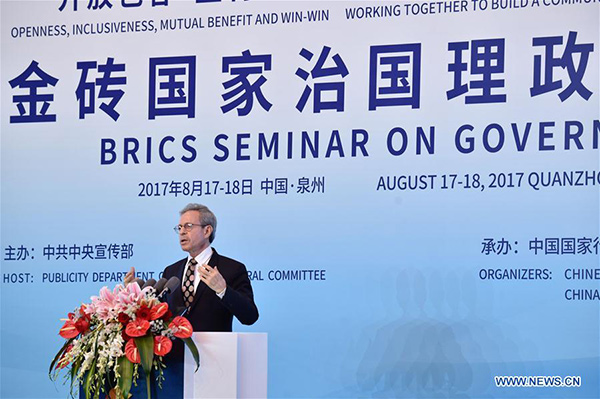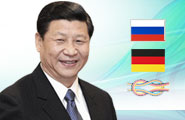Chinese experience highlighted at BRICS seminar on governance
 |
|
Robert Kuhn, a China expert from the United States, speaks at the BRICS Seminar on Governance in Quanzhou, East China's Fujian province, Aug 17, 2017. [Photo/Xinhua] |
Robert Kuhn, a China expert from the United States, expounded on how Chinese decision makers used the "Four Comprehensives" as an overarching framework and strategic blueprint to reach development goals.
The "Four Comprehensives" encompass efforts to pursue a moderately prosperous society, reform, rule of law and Party discipline.
Kuhn has penned many books on Chinese governance, the latest being "How China's Leaders Think." He said foreigners who dismiss these political aphorisms as simplistic sloganeering miss an opportunity to enrich their understanding of the realities of China and of governance experience that has broader applicability in the world.
Director of the China-Brazil Center for Research and Business Ronnie Lins said China's development model could serve as a benchmark for developing countries.
Essop Goolam Pahad, the editor of South Africa's Thinker Magazine, said China's experience in fighting poverty, for example, offers critical lessons for Africa.
China has lifted 700 million people out of poverty over the past 30 years and aims now to end poverty by 2020.
Pahad, who once served as Minister in the South African Presidency, said poverty persists in many African countries. Close to 400 million Africans survive on less than 1.25 US dollars a day.
Pahad said one Chinese lesson he learned was that the battle must begin by addressing the mindset of communities and their leaders: they must believe that development is possible, whatever the odds.
"The weak hatchling will never take off if it depends on government aid, financial grants, and welfare allowances," he said.
While highlighting China's success, most participants at the seminar also agreed that there is no one-size-fits-all development model to be copied.
Beijing has no intention of imposing its development model onto others, officials and experts said.
He Yiting, executive vice president of the Party School of the CPC Central Committee, said though China has made significant contributions to world governance, no development model remains unchanged.
He said the governance chaos we have seen around the world is largely a result of countries failing to find their development paths. The situation has been further complicated by foreign intervention.
"It is only the person who wears the shoes who knows whether they fit," he said, citing a Chinese proverb. "It depends on the people of a country to choose what suits them best."





















